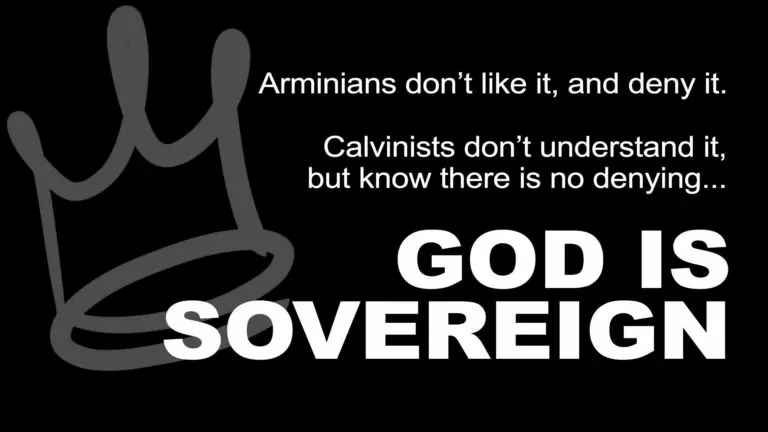Despite it being proclaimed as “back” by no less than Time magazine, Calvinism is not well-regarded by most Western Christians and particularly Americans. Calvinism does not, after all, fit the America mantra of “choice, choice and more choices.” Even to us, we can see that the much better theological fit for this type of thinking is certainly Arminianism.
Of course we shouldn’t be so very concerned about what type of theology best fits with our culture’s thinking, but should instead be seeking out what sort of theology best fits God’s revealed Word – we’re concerned with what is True, not what is popular.
So what is true then, Calvinism or Arminianism?
Well, both the core, and the most controversial element of Calvinism is the belief in God’s absolute sovereignty – He rules over all, including us, and the choices we make. In Arminianism the limits of salvation are based fundamentally on human responses – God invites us, and we decide whether we want to “let Jesus into our hearts.” Arminians hold that all people are sufficiently enabled to accept the gospel, if they’ll just decide to do so. Consequently, Arminianism tends to overestimate human ability.
This debate is therefore basically about the relationship between divine action on the one hand, and human responsibility on the other, in salvation and history.
Arminian critique of Calvinism
Arminians are extremely critical of the Calvinist view of salvation. Some claim that, to be consistent, a Calvinist needs to be a thoroughgoing determinist – a fatalist even. They caricature Calvinists as believing, “God will do what He will do, and has already decided who He will save, so it doesn’t matter what we do.”
We Calvinists, therefore, are hard-pressed to give an account for sin and evil in a way that is morally plausible. If God determines everything that happens, then it is hard to see why there is so much sin and evil in this world and why God is not responsible for it. If God determined all things, including our choices, surely He would not determine the sort of evil and atrocities that we have witnessed in history?
Arminians charge that Calvinists can’t make coherent sense of our claim that God makes a bona fide offer of salvation when he tells us to “repent and believe!” Furthermore, Arminians consider God’s sovereignty over human affairs is a threat to human freedom and responsibility. They claim that the doctrine of election casts God in the role of an arbitrary despot who is indifferent to human choice.
Arminians also claim that Calvinism offers the false hope of “once chosen, always chosen.” They caricature God’s predestination of the elect as a warrant to sin, since if you are elect, you will always remain elect, no matter what you do. Calvinism is said to lack the clear warrant to speak the most liberating word of encouragement available for persons struggling with their faith and doubt. How can anyone have assurance of salvation if you don’t know whether or not you belong to the elect?
Limiting the sovereignty of God
It’s clear then that the dispute between Calvinism and Arminianism represents starkly opposing theological views, at the heart of which are profoundly different views of God.
Though an emphasis on the sovereignty of God is frequently associated solely with Calvinism, it’s not unusual to hear Arminians also speaking about God’s supreme power and authority, and how He controls all things. That’s because Arminian pastors preach from the very same Bible we have, and there is no avoiding the conspicuous theme running through the Scriptures that God rules over all.
Thus the Arminian’s objection to the doctrine of sovereignty arises not from the Bible, but rather from man’s basic dislike for this disturbing and humbling aspect of God’s character. If God is in charge, we aren’t, and we don’t like that.
An evangelical theologian claims that the kingly model for understanding God’s authority is out-of-date. In our democratic times, he argues, it is more understandable and easier to comprehend God as Parent or as Friend, or even as Judge. We may call God Stronghold, Shield and Savior, but not King. I suggest that the wide variety of contemporary formulations of God to redefine His sovereignty are the direct result of denying a knowledge of God through His self-revelation in the Scriptures. So in evangelical sermons we seldom hear of God’s demand for total submission to the authority of His appointed king, Christ Jesus.
Another practical result of refusing to recognize God as the sovereign Lord over all is to carefully exclude Him from the decision-making institutions of our national life. If He is sovereign over all, then it’s clear there is no excluding Him from anything we do. But if we won’t acknowledge that, then we can pretend it is possible to exclude Him from certain parts of our life – we can kick Him out of our schools and workplace, and separate not just church from state, but God from government.
Our limited minds
So is God’s sovereignty limited? Absolutely not! The Bible everywhere declares that God is sovereign. All creation, from the falling of the smallest raindrop to the fate of the nations is in His hands and has a place in His plan. As someone puts it, “Scripture contains no hint that God has limited his sovereignty in any degree. God is Lord, from Genesis 1 to Revelation 22. He is always completely sovereign.”
Can we logically explain this doctrine? As James Montgomery Boice notes, “We may not understand that doctrine. We may still wonder why God tolerates sin. But still we won’t doubt the doctrine nor retreat from its consequences.”
This doctrine gives meaning and substance to all other doctrines. “It is,” as Arthur Pink observes, “the foundation of Christian theology.” But God’s sovereignty also means we must acknowledge Christ as King over every sphere of human activity, over the entire domain of human life, whether in education, politics, or business. And if God is not sovereign, how can we then believe in the fulfillment of prophecy? God is fully sovereign. He is active in all events and He always accomplishes His will. He assures us that the world in which we live is not chaotic, without a future. Instead it is under His fatherly control. He rules history and guides it to its goal. He restores and renews all things. He is the God who will one day consummate earthly judgment and redemption through the returning risen and ascended Savior.
Sovereignty of God in salvation
In Reformed theology God’s sovereignty is the ground of predestination and election, and God’s glory the chief goal of His decrees. The doctrine of election permeates and controls the whole Bible. From the beginning of the Bible to its end we are presented with the story of a universal purpose carried out through a continuous series of particular choices. For example, Abraham is chosen to be the pioneer of faith and so to receive the blessing through which all the nations will be blessed. The ground of election is not in those who are chosen, but in God Himself. The Bible states explicitly that God chose the redeemed “according to the good pleasure of His will” (Eph. 1:5). While not coercing the will, God irresistibly and effectively draws the elect to faith.
Without God reaching out to us, we would never become members of God’s family. On our own, we would not even think about the need for salvation. We are sinful by nature. Sin is the wrong orientation of all human existence since Adam’s fall, an orientation from which no one can free himself. The sinful inclination inherited from Adam pervasively impacts every area of our lives and bends every faculty toward the self and away from God. As C.H. Spurgeon notes: “There is hardly any doctrine more humbling than that of human depravity or original sin…The evil nature of man brings with it the fact that his will is altogether perverted.”
God’s gracious election, however, does not take away the need for individual repentance and faith in Christ. God’s sovereignty is a reality, and man’s responsibility is a reality too. God surely demands accountability for our actions (e.g. Acts 2:23). In other words, when a sinner is saved, all the glory belongs to God; when a sinner is lost, the sinner must take all the blame.
The blessings of sovereignty
The Bible presents the doctrine of God’s sovereignty as a source of great comfort and blessing to the saints. The evil in our life is real evil; our suffering is real suffering. But God is still in control and has a good purpose in all of it, even though we probably cannot see it now. Knowing that God is sovereign provides a deep sense of security. Christians will persevere in faith until the very end, when Jesus returns in glory or when they die. God perseveres with them (l Pet. 5:10). The assurance that we will reach our eternal home gives us courage to keep walking with the Lord.
Rev. Johan Tangelder (1936-2009) wrote for Reformed Perspective for 13 years and many of his writing has been collected at ReformedReflections.org.












